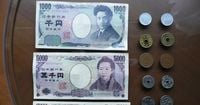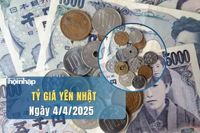On April 4, 2025, the Japanese Yen's exchange rate is witnessing a notable increase following a significant announcement from the United States regarding new tax policies. As global investors flock to the Yen as a "safe haven," the USD/JPY exchange rate has dropped to its lowest point in over three weeks.
This morning, the Yen exchange rate at various domestic banks shows slight differences. Vietcombank lists the buying rate at 169.81 VND/JPY and the selling rate at 180.60 VND/JPY. Meanwhile, Vietinbank has a buying rate of 171.72 VND and a selling rate of 181.42 VND per Japanese Yen. BIDV records a buying rate of 172 VND and a selling rate of 179.97 VND. Agribank's rates are 170.59 VND for buying and 178.68 VND for selling. Eximbank currently buys at 172.80 VND and sells at 178.79 VND. Sacombank has a buying rate of 172.91 VND and a selling rate of 179.93 VND. Techcombank lists a buying rate of 169.49 VND and a selling rate of 182.11 VND. NCB registers the lowest buying price at 165.84 VND and a selling price of 176.12 VND. HSBC shows a buying rate of 170 VND and a selling rate of 177.50 VND.
According to surveys, Eximbank has the highest Yen buying price, while HSBC has the lowest selling price. In the free market, the Japanese Yen is being traded at 174.18 VND/JPY for buying and 175.3 VND/JPY for selling. Compared to bank rates, this free market price is more competitive on the selling side but higher on the buying side.
Internationally, the Yen is demonstrating remarkable strength. Following the recent announcement from the U.S. about tax policies, global investors are seeking the Yen as a "safe haven," resulting in the USD/JPY exchange rate falling to its lowest level in over three weeks. This shift is attributed to defensive cash flows and expectations surrounding interest rate policies. Investors believe that the Bank of Japan (BoJ) will continue to raise interest rates to control inflation, while the U.S. Federal Reserve may soon lower rates to address economic pressures.
The recent decision by President Donald Trump to impose heavy tariffs on imported goods has raised concerns about a potential trade war, leading to increased market volatility. The U.S. has announced a 10% tax on all imported goods and has raised tariffs on several key trading partners, including Japan. This has prompted a swift move by investors towards safer assets, including the Yen and government bonds.
During the trading session on April 4, the USD/JPY exchange rate fell to approximately 146.80 before recovering by more than 50 pips. However, many experts view this as merely a technical adjustment within a broader downward trend, with significant pressure remaining on the U.S. dollar.
The market is closely monitoring key economic data from the U.S., including unemployment claims and the ISM services PMI, but the primary influence remains the evolving trade policy from Washington. The Japanese Yen is likely to maintain its upward momentum as global investors increase their risk aversion.
In addition to the defensive cash flow, the Yen's upward trend is bolstered by expectations that the BoJ will raise interest rates to combat inflation. Meanwhile, the Federal Reserve is under pressure to reduce interest rates to support the U.S. economy amid the new tax policies.
As the interest rate differential between the U.S. and Japan narrows, the attractiveness of the Yen compared to the U.S. dollar increases. If trade tensions continue to escalate and global financial markets experience significant fluctuations, the Yen is expected to appreciate further in the near future, solidifying its status as a leading safe-haven asset.
In summary, the Japanese Yen's rise on April 4, 2025, reflects broader economic anxieties and shifting investor sentiment. As the global landscape evolves, the Yen is set to play a crucial role in the financial strategies of investors seeking stability amid uncertainty.





